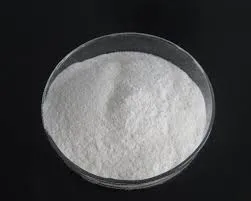
Nov . 19, 2024 03:20 Back to list
Hydroxyethyl Cellulose Applications and Benefits in Various Industries and Fields
The Versatile Applications of Hydroxyethyl Cellulose
Hydroxyethyl cellulose (HEC) is a water-soluble polymer derived from cellulose, a natural polymer that forms the basis of plant cell walls. As an essential ingredient in various industries, HEC's unique properties—such as its thickening, binding, and stabilizing capabilities—make it a highly sought-after compound in formulations for personal care, food, pharmaceuticals, and construction. This article explores the significance of hydroxyethyl cellulose, its applications, and its advantages over other hydrocolloids.
Properties of Hydroxyethyl Cellulose
HEC is characterized by its excellent solubility in water, providing a clear, viscous solution at low concentrations. It is non-ionic, which means it does not carry any charge, allowing it to function effectively across a wide range of pH levels and ionic strengths. This property is particularly beneficial in formulations where ionic components are present, as HEC does not interact negatively with them, ensuring the stability of the product. Additionally, HEC exhibits thermal stability, making it ideal for various processing conditions.
Applications in Personal Care Products
One of the most noteworthy applications of hydroxyethyl cellulose is in the cosmetics and personal care industry. HEC is commonly used as a thickening agent in gels, lotions, creams, and shampoos. It enhances the texture and viscosity of these products, providing a luxurious feel upon application. Moreover, its ability to retain moisture helps in formulating hydrating products aimed at improving skin softness and elasticity. The use of HEC in personal care formulations is particularly advantageous as it is non-toxic and safe for topical application, making it suitable for sensitive skin.
Role in Food Industry
hydroxyéthyl cellulose

In the food industry, hydroxyethyl cellulose serves as a stabilizer and thickener in various food products. Its ability to modify the texture and mouthfeel enhances the overall eating experience. HEC is commonly used in sauces, dressings, and dairy products to increase viscosity and improve consistency. Additionally, it functions as a fat replacer, helping to lower the calorie content of certain food items while maintaining desirable textures. The food-grade quality of HEC ensures consumer safety, making it an ingredient of choice for healthier food formulations.
Pharmaceutical Applications
Hydroxyethyl cellulose is extensively utilized in the pharmaceutical sector, primarily in drug formulations. It acts as a binder in tablet production, ensuring uniform distribution of active ingredients, which is crucial for the effectiveness of medications. HEC is also employed in the formulation of controlled-release systems, where it regulates the release rate of drugs within the body, improving therapeutic efficacy. Moreover, due to its hydrophilic nature, HEC is utilized in eye drops and topical ointments as a lubricant, enhancing comfort upon application.
Construction Industry Usage
The versatility of HEC extends to the construction industry, where it is used as a thickening agent in cement-based products such as adhesives, grouts, and mortars. Its addition helps improve the workability and adhesion properties of these materials, facilitating easier application and enhancing overall performance. Furthermore, HEC contributes to extending the open time of these products, allowing builders to work at a more manageable pace.
Conclusion
Hydroxyethyl cellulose stands out as a multifunctional ingredient with a broad range of applications across diverse industries. Its unique properties, such as excellent solubility, non-ionic character, and thermal stability, make it an ideal choice for formulations in cosmetics, food, pharmaceuticals, and construction. As consumers continue to seek innovative and effective products, the demand for hydroxyethyl cellulose is expected to grow, further solidifying its role as an essential component in modern-day formulations. Through its exceptional versatility, HEC continues to contribute significantly to improving product performance and consumer satisfaction across various sectors.
-
Versatile Hpmc Uses in Different Industries
NewsJun.19,2025
-
Redispersible Powder's Role in Enhancing Durability of Construction Products
NewsJun.19,2025
-
Hydroxyethyl Cellulose Applications Driving Green Industrial Processes
NewsJun.19,2025
-
Exploring Different Redispersible Polymer Powder
NewsJun.19,2025
-
Choosing the Right Mortar Bonding Agent
NewsJun.19,2025
-
Applications and Significance of China Hpmc in Modern Industries
NewsJun.19,2025







